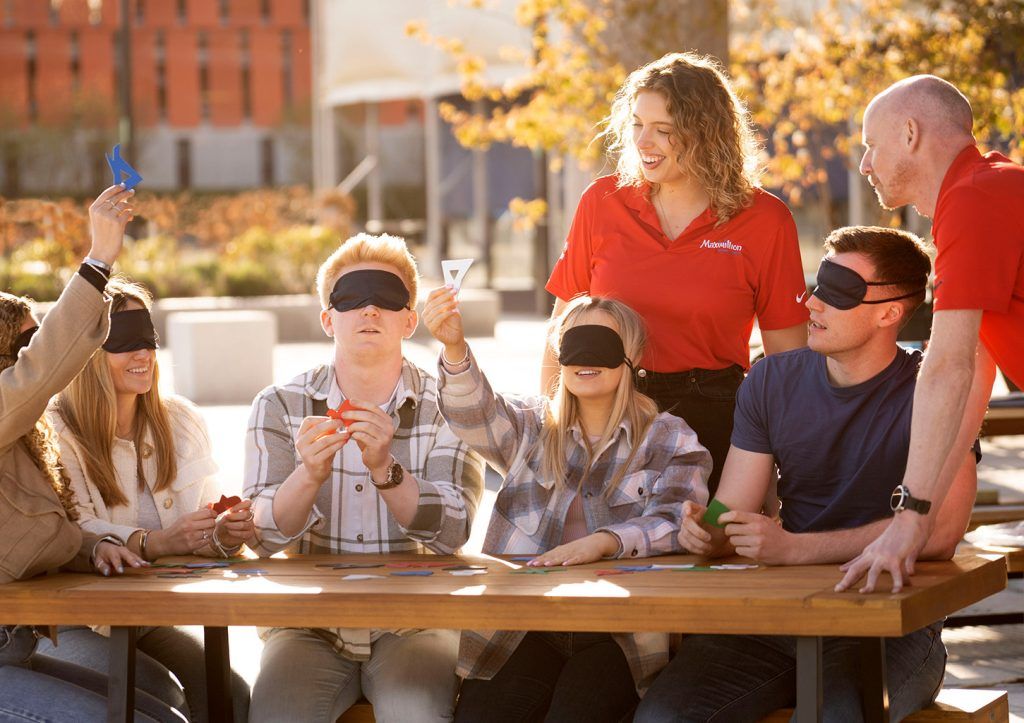How to Build Trust in a Team
How to Build Trust in a Team
Trust is more than a soft skill, it’s the foundation of high-performing teams. But creating a culture of trust doesn’t just happen by magic. It’s something that you have to work to create.
But where do you begin?
At Maximillion, we’ve spent decades helping organisations and business leaders create trust-filled cultures. And we’ve had a lot of fun along the way, too.
Whether you’re forming a new team or strengthening an existing one, trust is the secret ingredient that transforms cooperation into collaboration: and collaboration into results.
In this blog, we draw on our experience of experiential learning and structured development programmes, based on powerful behavioural models, to give you some tips on trust-building.
What is Trust in the Workplace?
Trust within teams is about more than just having good personal relationships. It’s knowing your colleagues have your back, and believing that they’ll act with integrity, follow through on what they say they’ll do, and treat you with respect.
One way to understand how a sense of trust is built (or broken) is through the Four C’s of Trust: Competence, Consistency, Commitment, and Communication.
- Competence is about having the skills and knowledge to do your job well.
- Consistency means showing up reliably and behaving in a way others can count on.
- Commitment reflects your dedication to shared goals and to the success of the team.
- Communication ties it all together: open, honest dialogue builds transparency and connection.
Strong teams cultivate all four to create a solid foundation of trust.
Trust among team members fosters psychological safety, mutual respect, and shared purpose. These combine to create a safe environment that can have an amazing effect on team performance.
Charles H. Green’s Trust Equation breaks it down:
Trust = (Credibility + Reliability + Intimacy) / Self-Orientation.
The more your team members demonstrate competence, consistency, and authenticity – while keeping their egos in check – the greater the levels of trust between them.

Why Building Trust Matters
Simon Sinek puts it best:
“A team is not a group of people that work together. A team is a group of people that trust each other.”
Without mutual trust, teams struggle. Communication falters. Conflict simmers. Fear of judgment and negative feedback cause people to play it safe, and then creativity stalls.
In high-trust companies, teams flourish. They collaborate openly, adapt faster, and perform better. It’s this effective communication and environment of collaboration that makes your team a team, and not just a bunch of colleagues.
Creating this sense of community and encouraging positive relationships between team members of all levels also ties into employee well-being. This has proven business benefits, with global analytics firm Gallup finding that employees with high well-being are 20% more productive and 21% more profitable than those with low well-being.
How to Build Trust in a Team
Drawing from our experiences of building team trust, and established models like Lencioni’s 5 Dysfunctions of a Team, Belbin’s Team Roles, and the Johari Window, here are some tried and trusted ways to foster lasting employee trust:
Support Personal and Professional Growth
Trust grows when people feel invested in. Maximillion’s phased approach – diagnose, engage, deliver, evaluate – ensures individuals can reflect, grow, and bring their best selves to the team.
Personality assessments like the Myers-Briggs Type Indicator (MBTI) and Belbin Team Roles Model can help team members understand each other’s preferences and strengths, laying the groundwork for mutual respect and empathy.
Recognise Excellence and Reward It
Appreciation builds trust. Whether through peer recognition or leadership shout-outs, acknowledging contributions boosts morale and shows people their efforts matter.
Recognising excellence isn’t about handing out gold stars. It’s about noticing what matters and showing people that their contributions are valued: whether they’re delivering results, supporting others, or living your team values in action.

To create an environment of trust, we encourage teams to embed recognition into their day-to-day culture: don’t just save it for annual reviews or end-of-project celebrations.
Foster Transparent Communication
Trust thrives on openness. Use frameworks like the Johari Window – which helps people explore what is known and unknown about themselves and others – to encourage self-disclosure and feedback. Create space for honest conversations, even when they’re uncomfortable.
Some other ways to do this include:
Promote Honesty and Integrity:
- Model openness, be candid about challenges, and own up to mistakes.
Practice active listening sessions with team members:
- Listening circles or feedback sessions will help to show people they’re heard. Make sure you really do listen: trust issues could start if these sessions feel performative.
Solicit and Act on Feedback:
- Make reflection part of your team’s rhythm. Stop/Start/Continue learning logs can be a simple but powerful tool. These structured prompts encourage people to reflect on three key questions:
- 1. What should we stop doing because it isn’t working or adding value?
- 2. What should we start doing to improve our diversity?
- 3. What’s working well that we should continue to maintain or reinforce?
Recognise Individual Contributions:
- Beyond performance reviews, build in regular reflection moments to highlight individual wins.
Create a Culture of Accountability
Accountability isn’t about blame, it’s about ownership.
In high-performing teams, people tend to own up to their mistakes, deliver on their promises, and encourage their colleagues to do the same. Trust plays a crucial role here, as fear of punishment could discourage employees from taking responsibility.
As teams move through the Forming–Storming–Norming–Performing cycle (the stages teams go through as they build trust and develop), clarity around roles and responsibilities is key.
Figure out who’s doing what, and who’s responsible for which outcomes to set expectations. Without clarity, misunderstandings and frustrations can undermine trust before it has a chance to grow.
For a fun way to reinforce accountability, try our Team Top Trumps energiser. This reveals behavioural patterns and performance preferences in a fun, engaging way.
Build Relationships through Team Building Activities
Trust deepens through shared experience. Maximillion’s team-building events – from business simulations to outdoor challenges – help teams build stronger bonds as they solve problems under pressure.
Get your entire team together to enjoy some of our most popular trust-building activities:
- Eden: This activity is designed to encourage strategic thinking and collaboration among team members: with a successful outcome determined by whether they choose to collaborate or compete.
- Kinetic Connections: This hands-on activity focuses on enhancing communication and problem-solving skills within teams, by getting participants to collaborate to create mechanical models out of a chaotic mess of parts. Did we mention there’s very little direction here?
- The Big Picture: Bring out your team’s creative side with giant canvases and massive pots of paint, as your team works together to create an artistic interpretation of your key organisational messages.
- Team Works In: This series of fun but challenging activities is designed to strengthen your team’s communication and collaboration, encouraging them to review their strengths, strategy and development areas.
- Team Works Out: Similar to Team Works In, but it takes place in the great outdoors.
- Lego Serious Play: Who doesn’t love LEGO? This activity uses the famous bricks to facilitate creative thinking and problem-solving within teams.
You don’t need to have everyone in the same place, either. If your company culture favours remote and hybrid work, our online events can bring virtual teams together without geography getting in the way.
Experiential learning, like the above Maximillion events, don’t just build better understanding. They also create real memories that act as trust anchors and help to foster a supportive environment.
Want to start smaller? Try these 10 work team-building activities at your next get-together.

Celebrate Successes Together
Celebrating success isn’t just a feel-good gesture. It’s a vital part of building trust, boosting employee engagement and encouraging team unity.
When colleagues take time to recognise each others’ achievements and share appreciative feedback, they reinforce a shared sense of purpose and remind each other that their efforts matter.
At Maximillion, we’ve seen how structured celebration – whether through a formal reflection session, a spontaneous team shout-out, or even a relaxed social gathering – can act as a bonding moment. It turns “I did this” into “We did this”.
Celebration doesn’t have to be elaborate. It could be as simple as:
- Sharing a round of “what went well” at the end of a project
- Highlighting individual and team accomplishments during team meetings or stand-ups
- Pausing to reflect on learning and growth during the business day, not just focusing on results
- Hosting a team lunch or offsite to mark milestones and build momentum.
These moments create a positive feedback loop. They boost morale, build confidence, and deepen trust by showing that success is not just expected: it’s appreciated. And when people feel celebrated, they’re more likely to celebrate others: creating a culture where support and recognition are the norm, not the exception.
In short: make celebration a habit, not a one-off. When teams take pride in each other’s wins, they grow stronger, together.
Start Building Trust In Your Team Today
Building trust isn’t a one-off workshop, it’s a practice. Start with small shifts: open a tough conversation, run a learning log session, or ask for feedback. Then layer in more structured development using the models and methods that have helped hundreds of Maximillion clients build high-performing, trust-based teams.
If you’re ready to strengthen relationships, boost performance, and build a team that genuinely works well together, we’re here to help.
Get in touch today to explore how we can support your team’s next step.

FAQ’s
What are the signs of low trust in a team?
Low trust in a team shows up in subtle, but damaging, ways. For example:
- Team members might withhold ideas or concerns, fearing judgment or dismissal, which stifles creativity and innovation
- Feedback becomes rare or superficial, as people avoid honest conversations that could lead to conflict
- A blame culture may start to emerge, where mistakes are deflected rather than owned, and individuals become more focused on self-preservation than shared success.
- As accountability fades, so does motivation – leading to low morale, disengagement, and eventually high staff turnover.
Left unaddressed, these signs can seriously impact performance and team wellbeing.
How can leaders rebuild trust after a conflict?
Rebuilding trust after a conflict starts with acknowledging that something has gone wrong. It takes courage and humility to face the issue head-on, but naming the problem openly is the first step toward resolution.
Leaders should create space for honest, blame-free conversation, where team members feel safe to express how the situation has impacted them. This kind of open dialogue helps clear the air and re-establish psychological safety.
Of course, talk alone isn’t enough. Trust is rebuilt through consistent action. That means following through on commitments, being transparent in decision-making, and modelling the behaviours you want to see from others.
It can also help to revisit your team’s ground rules – the shared agreements that guide how you work together – and update them if you need to reflect new expectations or lessons learned.
Finally, encourage the team to reflect together. What went wrong? What can we learn? What will we do differently next time? Shared reflection not only helps process the conflict – it strengthens the team’s ability to face future challenges with more openness and resilience.
What are some quick ways to foster trust in a new team?
One of the quickest ways to build trust in a new team is to invest time in understanding each other’s working styles. Tools like Belbin Team Roles or the MBTI (Myers-Briggs Type Indicator) offer valuable insights into how individuals prefer to communicate, collaborate, and make decisions – laying the groundwork for empathy and mutual respect.
From day one, take time to agree on team ground rules: simple, shared expectations that shape how you’ll work together and navigate challenges. This helps set a clear tone of accountability and fairness.
Make space for regular reflection and feedback, even in small ways – quick check-ins after tough meetings or structured reviews after a project phase.
And don’t underestimate the power of simply doing something fun together. A team lunch, a collaborative game, or a light-hearted challenge outside of daily tasks can break down barriers and build relationships that make working together smoother and more enjoyable. These small actions create early wins in trust – and set the tone for long-term collaboration.
